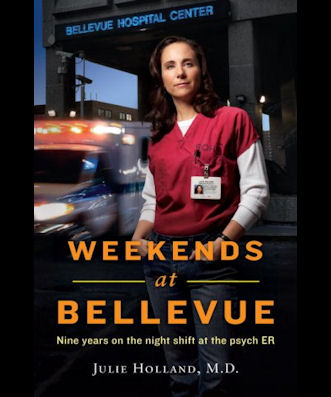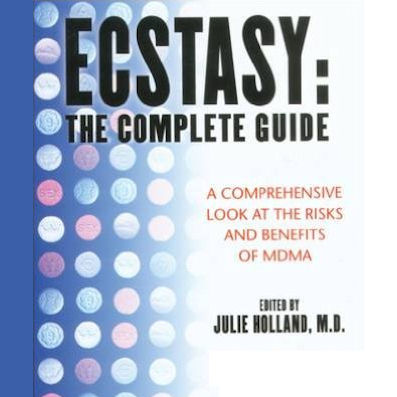Weekends at Bellevue: Give 'Em the Old Razzle Dazzle
Being a patient on an inpatient psych ward can be a lonely, loveless experience. There is nothing to do all day, and the walls are the same drab gray as the chairs, the food, and the staff. As a third year resident, I would sometimes bring my guitar to the Veteran's Hospital in the Bronx and play for the patients on the schizophrenia research ward, where I was the chief resident. I couldn't help but play songs that I thought would have special meaning, like John Lennon's Watching the Wheels. (People think I'm crazy, dreaming my life away...) or Joe Walsh "Life's Been Good" (they say I'm crazy but it takes all my time...).
There was one veteran who had a strong, fixed delusion that he was Elvis. He didn't have the hair for it, but he could sing pretty well. I made a point of learning "Love Me Tender" so he could show off in front of the other patients on the unit. There was another patient there who often wore dark sunglasses and expended a certain amount of energy trying to look cool, slouching on the couch, sucking on his teeth. He was a big Jimi Hendrix fan, and I would let him play my guitar for his friends. He would brag about how he had a recording contract pending, or a concert coming up, and I would nod my head appreciatively, trying not to wince as he strummed my acoustic guitar atonally.
In college and medical school, I played in a band, and I finally had to quit when third year rotations came around, but I never gave up on music. During my surgery rotation in the emergency room, I would sometimes sing to my patients while I was suturing their wounds. I remember one guy who beat up his girlfriend when he was drunk. She had several brothers who came looking for him. By the time he walked into the ER, he was a mess. I was new at suturing, but my surgery resident thought it would be okay for me to practice on him. (That's how it was in medical school. We learned as we went along, often performing procedures we had only seen once, practicing on unsuspecting patients.)
I spent hours meticulously cleaning and sewing the man's numerous lacerations while singing lullabies: old James Taylor and Joni Mitchell songs, anything I could think of to keep me occupied and him distracted. The music helped me to treat him kindly, to think of him as a baby who needed to be sung to sleep. He had been treated harshly already, beaten nearly to death, and I felt he deserved my tender ministrations. He gradually dozed off while I was sewing, and I hummed to myself while the smell of the alcohol in his blood wafted toward my nose.
When I got to Bellevue, I would occasionally sing for the patients, but it happened less as I got older. There was one especially rowdy night when the patients were forming a rag-tag group, back in the old CPEP before we moved into the larger space. They were singing "He's got the whole world in his hands." The song wasn't my idea, but I was willing to sing along with just about anything, and the patients were substituting in various things to be "in his hands." Someone improvised a verse: "He's got the Bellevue Hospital in his hands." I sang along, believing it whole-heartedly as I grinned skyward.
There were times during a CPEP shift when I would start to feel down, and I would get that old "I'm a cog in a machine" feeling. Those were the nights I would sing my signature song to the nurses, accompanied by a jig, of sorts. Stolen from a stand-up comic, it went a little something like this: "I don't care. I don't care. I don't care." Then I would add in the chorus, who I imagined would come behind me with quivering jazz hands, "She does not care! She does not care!" It was a perennial favorite, that song. Nancy would ask me to sing it for her every once in a while, or she would start it for me, hoping I'd join in, if she saw me getting riled up about something I could not control.
And then there was the tap-dancing. After Jeremy and I bought our house in the country, I found a cute little dance studio by the train station. I signed up for weekly lessons. I hadn't taken a dance class since I was three years old, when my mom would drive me to the purple house on the other side of town for my obligatory ballet class. I'll tell you, nothing is quite as frivolous or liberating as learning to tap-dance when you're pushing forty.
After I found out that Julia, the social worker, also knew how to tap dance, I insisted she bring in her shoes on the weekends. There were a handful of stolen moments on Saturday nights around 11 or so when we would go out to the hallway and do our little routine. We devised some dance steps to accompany the Soul Coughing song "Down to This" with the chorus "You get the ankles and I'll get the wrists." I fantasized if we ever had a CPEP talent show, it'd be the perfect theme song, tap-dancing around the issue of restraints.
Occasionally, when Julia and I were feeling brave, we would dance right in the nurses' station. The nurses loved it, but the patients didn't know what to think. Perhaps they thought they were hallucinating, or maybe they understood that we needed to let off a little steam. I hope they took it in stride, as they took most things that happened in CPEP.
One time we were tap-dancing in the hallway outside of the doctor's call-rooms. I learned, years later, that two of the doctors were in a call-room having sex, and were quietly waiting for us to finish dancing so they could clandestinely leave. These are the sorts of confessions I heard when residents became attendings and felt they could confide in me more freely.
Singing, dancing, guitar playing: there was time to squeeze in music and merriment at my job, in between the paperwork, the interviews, and the sedatives. There were plenty of patients who sang their songs - sang them loud, sang them proud. Anytime a patient serenaded me, I'd try to be an appreciative, attentive audience. Song choice can tell you a lot about how someone's feeling.
Or how I'm feeling. Often, after getting to know a patient for a few hours and devising a treatment plan in the hopes that they could leave the CPEP and have a better life, I'd be tempted to sing the last few strains of the song "So Long, Farewell" from The Sound of Music, the high notes of "goodbye" fading away as the patient walks out the door, past the metal detector, and into the cold heart of the city.






